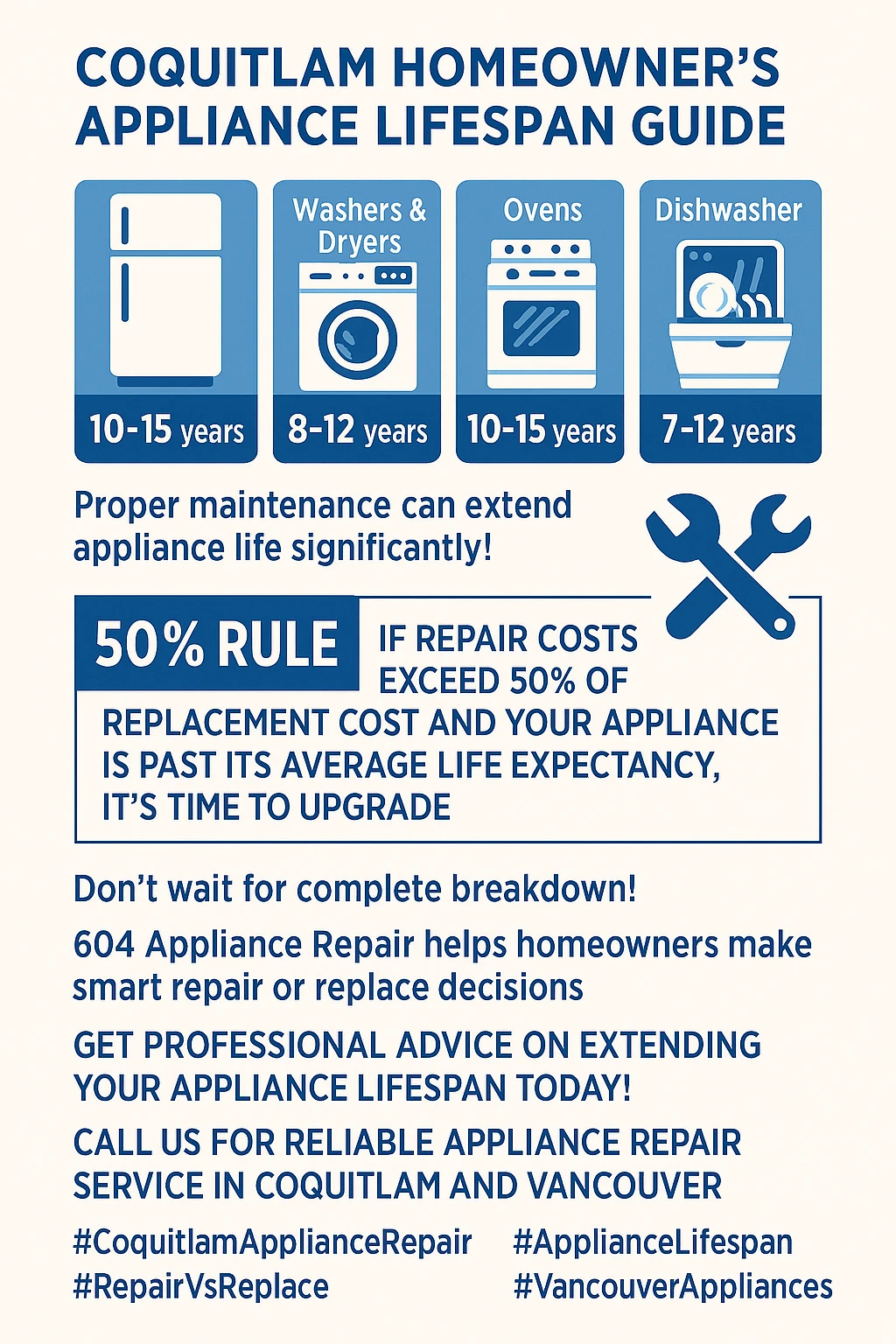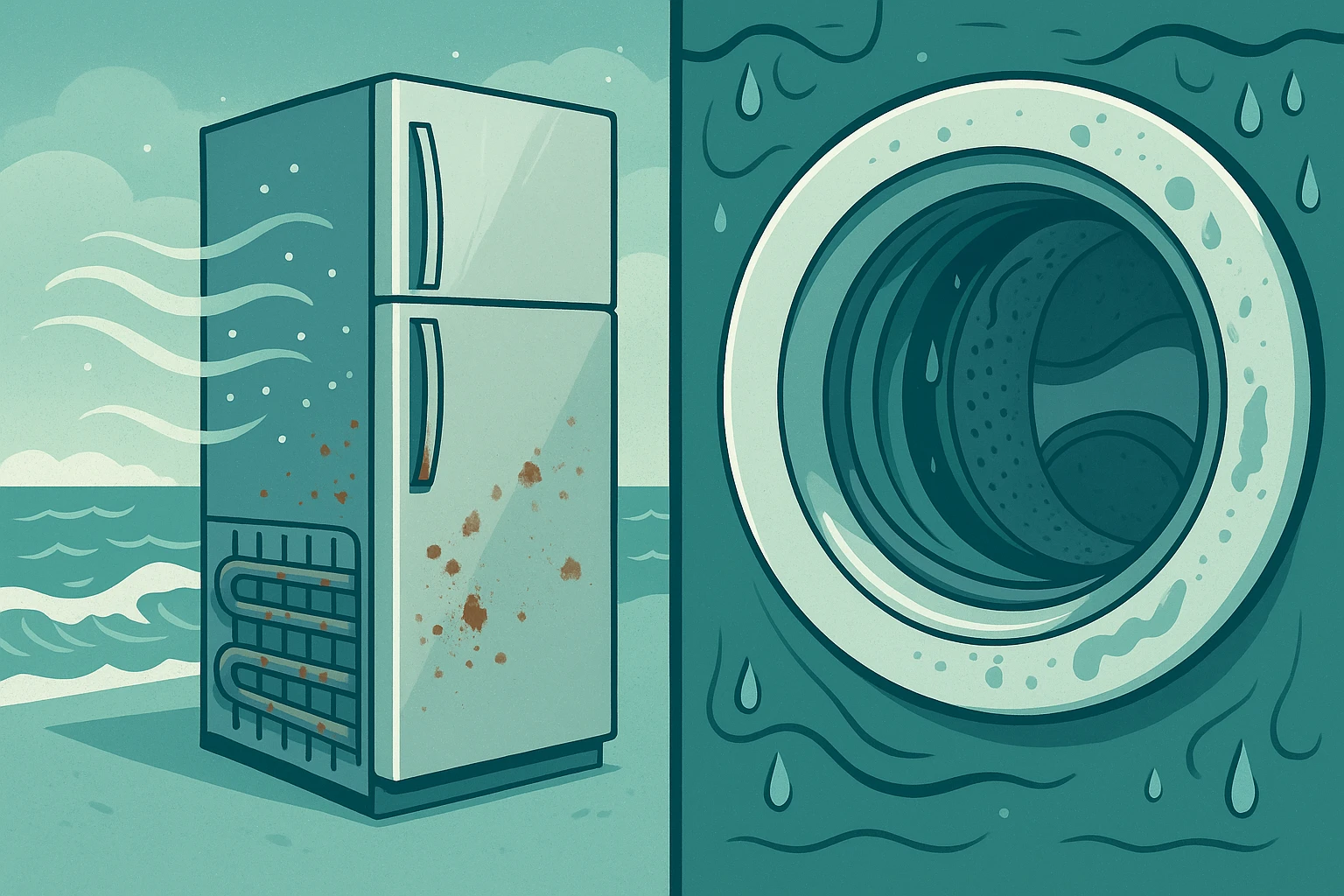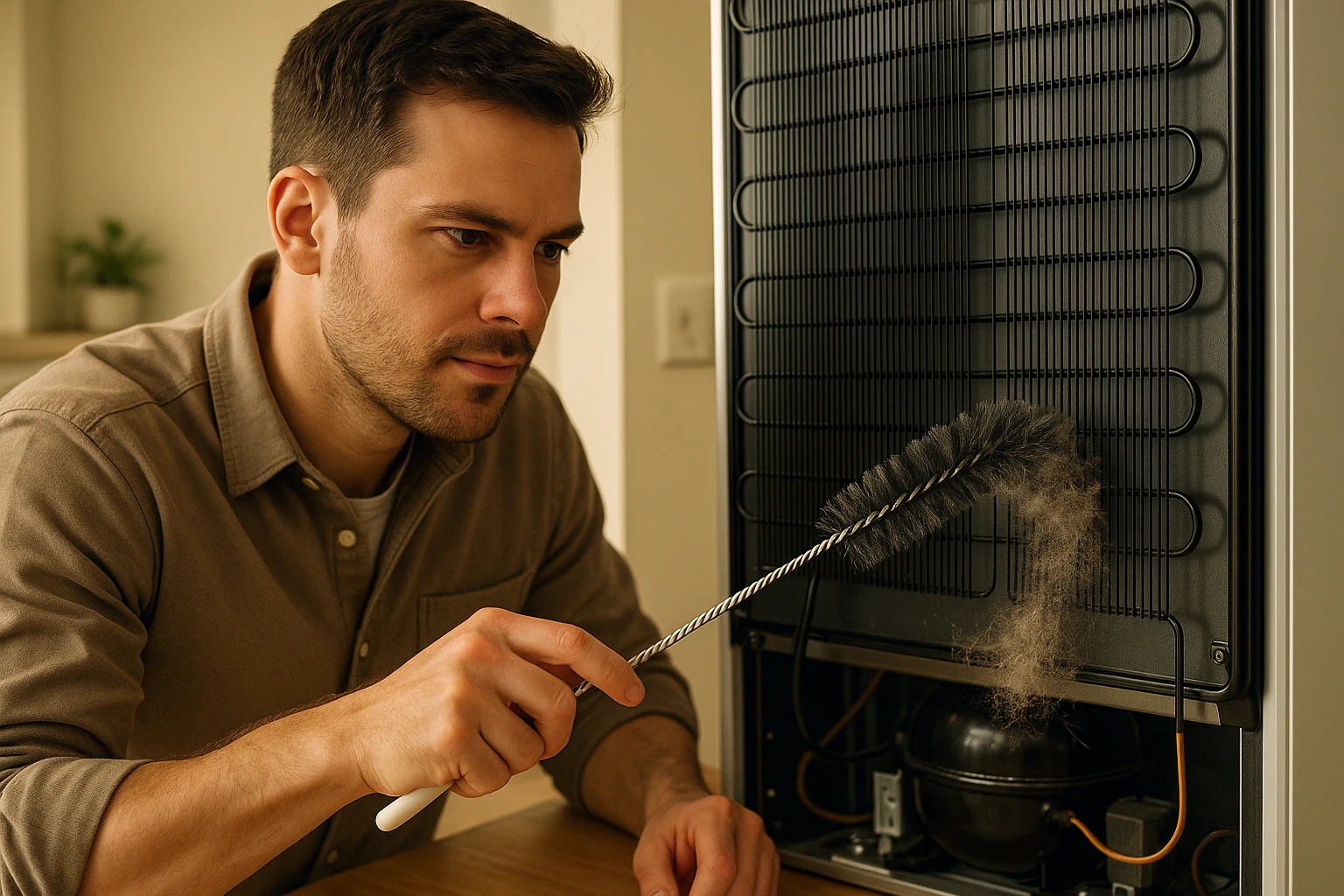How Long Should Your Appliances Last? A Coquitlam Homeowner’s Timeline for Planning Repairs vs Replacements
Got a dishwasher that’s making weird grinding noises or a fridge that’s clicking more than your dad’s old camera? Understanding how long your appliances should actually last can save you from those panic-inducing moments when everything seems to break at once – plus help you budget like the savvy homeowner you are!
Picture this: you’re standing in your kitchen on a Saturday morning, coffee in hand, when you notice your dishwasher making that weird grinding noise again. Or maybe you’ve caught yourself staring at your refrigerator, wondering if those occasional clicking sounds mean it’s time to start appliance shopping. Trust me, I’ve been there – that moment when you realize you have absolutely no idea how long your appliances are supposed to last or whether that repair quote is worth it.
Living in Coquitlam adds its own unique twist to the appliance game. Our coastal climate, with its salty air and humidity swings, can be tough on our household helpers in ways that don’t affect our prairie or inland friends. That gorgeous ocean breeze? It’s carrying salt that can wreak havoc on metal components. Those cozy, damp winter months? They’re creating the perfect storm for mold and moisture issues in appliances that weren’t designed with Vancouver’s specific challenges in mind.
But here’s the thing – understanding appliance lifespans isn’t just about avoiding surprise breakdowns, though that’s definitely part of it. It’s about making informed decisions that can save you thousands of dollars and keep your home running smoothly. Whether you’re dealing with a temperamental washing machine or planning your next kitchen renovation, knowing what to expect from your appliances can help you budget smarter and avoid those panic-inducing moments when everything seems to break at once.
Key Outtakes:
- Most major appliances have predictable lifespans: refrigerators last 10-15 years, washers and dryers 10-13 years, and dishwashers around 10 years
- Coquitlam’s coastal climate can impact appliance longevity through salt air corrosion and humidity-related issues
- Proper maintenance can extend appliance life significantly – sometimes by 3-5 years beyond average expectations
- Energy efficiency improvements in newer models often justify replacement even when older appliances are still functioning
- The timing of appliance failure often falls into predictable patterns based on usage and environmental factors

Understanding Realistic Appliance Lifespans in Your Coquitlam Home

Let’s start with the foundation – what can you actually expect from your major appliances? I’m not talking about the optimistic numbers from marketing brochures, but real-world lifespans based on typical usage patterns and maintenance habits. Think of appliances like cars: they’ll run longer with good care, but even the best maintenance can’t stop the march of time and wear. Understanding these realistic expectations helps you plan better and avoid the shock of unexpected replacements.
Your refrigerator is the marathon runner of your kitchen, working 24/7 to keep your food fresh and safe. Most quality refrigerators will serve you faithfully for 10 to 15 years, with some units pushing closer to 18 years with excellent care. The key factors affecting lifespan include how often the door is opened, those midnight snack runs add up, the quality of your home’s electrical supply, and whether you keep those condenser coils clean. In Coquitlam, I’ve noticed that refrigerators in homes closer to the waterfront tend to need replacement slightly sooner due to salt air affecting the exterior components and seals.
Washing machines and dryers typically last 10 to 13 years, though this can vary significantly based on usage patterns and water quality. If you’re doing multiple loads daily for a large family, expect to trend toward the lower end of that range. Front-loading washers, while more energy-efficient, can be particularly susceptible to Vancouver’s humidity issues, often developing seal problems or mold issues that can shorten their effective lifespan. Gas dryers generally outlast electric models by a year or two, and proper ventilation is crucial – something that’s especially important in our damp climate where moisture buildup can cause additional strain on the system.
Dishwashers usually give you about 10 years of service, though Coquitlam’s varying water hardness levels across different neighborhoods can affect this significantly. Areas with harder water may see mineral buildup that reduces efficiency and lifespan, while very soft water can actually be too aggressive and damage certain components over time. Your range and oven combination typically lasts the longest of your major kitchen appliances, with gas ranges often outlasting electric models by several years – expect 13 to 20 years depending on cooking habits and maintenance.
Coquitlam’s Unique Climate Challenges for Appliance Longevity

Now that we’ve covered the basics, let’s talk about what makes Coquitlam unique when it comes to appliance longevity. Our beautiful coastal location comes with environmental challenges that can significantly impact how long your appliances last, and understanding these factors can help you make better maintenance and replacement decisions. These aren’t issues that homeowners in Calgary or Winnipeg typically face, making local knowledge crucial for smart appliance management.
The salt air that makes our sunsets so spectacular is unfortunately not kind to appliances. Even if you’re not directly waterfront, salt particles can travel surprisingly far inland, especially during storms or high winds. This salt air accelerates corrosion in metal components, particularly affecting the exterior coils of refrigerators, the metal drums of washing machines, and any exposed wiring or connections. I’ve seen refrigerators in areas closer to Burnaby Mountain develop coil issues years earlier than identical models further inland, simply due to their exposure to coastal conditions.
Coquitlam’s humidity levels create another layer of complexity. Our damp winters can promote mold and mildew growth in appliances that deal with moisture, like washing machines and dishwashers. Front-loading washers are particularly vulnerable – that rubber door seal that makes them so efficient also creates the perfect environment for mold growth in our humid climate. This isn’t just a cosmetic issue; mold can cause seals to deteriorate faster and create persistent odor problems that make the appliance unpleasant to use long before it actually fails mechanically.
The temperature fluctuations we experience, while mild compared to other Canadian cities, still stress appliance components. The swing from our cool, damp winters to dry summer conditions causes materials to expand and contract repeatedly. This is particularly hard on seals, gaskets, and electronic components. Air conditioning units and heat pumps work harder in our variable climate than they would in more stable conditions, and appliances in unheated spaces like garages or basements face additional thermal stress that can shorten their effective lifespan.
Power quality issues are another Coquitlam-specific consideration that many homeowners don’t think about. Our aging electrical infrastructure in some neighborhoods, combined with occasional outages during windstorms, can stress appliance electronics. Frequent power fluctuations or surges can gradually damage control boards and electronic components, leading to premature failure of what should be long-lasting appliances. This is why surge protectors aren’t just for computers – your expensive appliances need protection too, especially in areas prone to electrical fluctuations.
Smart Maintenance Strategies for Maximum Appliance Life

Here’s where we separate the appliances that barely make it to their expected lifespan from those that become family legends, still running strong years past their supposed expiration date. Proper maintenance isn’t just about following the owner’s manual – it’s about understanding your appliances’ needs and adapting your care routine to Coquitlam’s specific challenges. The difference between a refrigerator that lasts 10 years and one that lasts 18 often comes down to consistent, informed maintenance practices.
Let’s start with your refrigerator, that tireless kitchen workhorse. The single most important maintenance task is cleaning those condenser coils, but in Coquitlam’s dusty, salty environment, you need to do this more frequently than the manual suggests. I recommend checking and cleaning coils every three months rather than the typical twice-yearly schedule. Use a coil brush and vacuum to remove dust, pet hair, and salt residue that can insulate the coils and force your compressor to work harder. Pay special attention to door seals – clean them monthly with a mild bleach solution to prevent mold growth that can compromise the seal’s effectiveness.
Your washing machine needs different care depending on its type and your home’s water conditions. For front-loaders in Coquitlam’s humid environment, leave the door cracked open between loads to prevent mold growth, and run a cleaning cycle monthly with either commercial washing machine cleaner or a cup of white vinegar. Check and clean the drain pump filter regularly – our frequent rain can sometimes introduce more lint and debris through ventilation systems. For all washers, inspect hoses annually for signs of bulging, cracking, or mineral buildup, and replace them every five years regardless of appearance.
Dryer maintenance goes beyond just cleaning the lint trap, though that’s absolutely crucial for both efficiency and fire prevention. In Coquitlam’s damp climate, ensure your exterior vent isn’t blocked by vegetation or debris, and check that the vent flap opens and closes properly. Poor ventilation forces your dryer to work harder and can lead to overheating. Clean the entire vent system annually – this is particularly important in our area where moss and vegetation can quickly block exterior vents. Also, wipe down the interior drum periodically to remove any residue from fabric softeners or dryer sheets that can affect performance over time.
Dishwasher maintenance in Coquitlam requires attention to both hard water mineral buildup and the organic growth that our humidity encourages. Run an empty cycle with dishwasher cleaner monthly, and inspect the spinning arms for clogs – small food particles combined with our variable water quality can create stubborn blockages. Clean the door seals and check the door alignment regularly, as our humidity can cause wooden cabinets to swell and affect door closure. Keep the rinse aid dispenser filled to help with drying in our humid environment, and don’t forget to regularly clean the filter at the bottom of the tub.
For ranges and ovens, focus on keeping burner ports clear and checking gas connections annually if you have gas appliances. While our seismic activity is generally mild, it can gradually loosen connections over time. Electric ranges need attention to drip pans and heating elements, and both types benefit from regular oven cleaning to prevent buildup that can affect heating efficiency and create unpleasant odors. Consider having a professional inspection every few years to catch issues before they become major problems.
Recognizing When It’s Time to Replace vs Repair
Sometimes, despite our best maintenance efforts, appliances reach the end of their useful life. Knowing when to call it quits can save you from throwing good money after bad repairs, and understanding the warning signs helps you plan for replacement before you’re stuck with spoiled food or piles of dirty laundry. The trick is learning to read the signs your appliances are giving you and making informed decisions based on both economics and practicality.
Age is the most obvious factor, but it’s not just about hitting a magic number. An 8-year-old appliance that’s been well-maintained might have years of life left, while a 6-year-old unit that’s been neglected could be ready for replacement. The key is looking at the overall condition and recent repair history. If you’ve had two or more significant repairs in the past year, or if repair costs are approaching 50% of replacement cost, it’s time to start shopping. This is especially true for older units where finding parts becomes difficult or expensive, a common issue with discontinued models.
Performance decline often signals the beginning of the end. Your refrigerator struggling to maintain temperature, taking longer to cool down after being opened, or running constantly are all signs that the compressor or cooling system is failing. Similarly, if your washing machine isn’t getting clothes clean, is leaving excessive moisture, or has developed a permanent musty smell despite cleaning efforts, the mechanical systems may be wearing out. These performance issues often worsen gradually, so you might not notice the decline until it’s significant enough to affect your daily routine.
Unusual noises are your appliances’ way of crying for help, and in Coquitlam’s generally quiet residential areas, these sounds are often more noticeable. Grinding, squealing, or clicking sounds that persist after basic maintenance usually indicate worn bearings, failing motors, or loose components. While some noise issues can be repaired, they often signal that other components are under stress and may fail soon. Don’t ignore these warning signs – addressing them early can sometimes extend appliance life significantly, but more often they’re harbingers of bigger problems to come.
Energy efficiency decline is another compelling reason for replacement, especially with BC’s rising electricity costs. If your utility bills have crept up without changes in usage patterns, older appliances working harder to maintain performance could be the culprit. Modern appliances are significantly more efficient than models from even five years ago, and the energy savings can offset replacement costs over time. This is particularly relevant for always-on appliances like refrigerators and for frequently used items like washing machines and dryers, where the cumulative savings can be substantial.
Safety concerns should always trigger immediate replacement consideration. Any appliance showing signs of electrical issues – flickering lights when it runs, burning smells, or giving slight shocks – needs professional evaluation immediately. In Coquitlam’s humid environment, electrical safety is particularly important as moisture can exacerbate wiring problems. Gas appliances showing signs of poor combustion, irregular flames, or gas odors require immediate professional attention and often replacement. When safety is at stake, the cost of replacement is always justified compared to the potential consequences of continued operation.
Planning Your Appliance Replacement Timeline
Creating a strategic timeline for appliance replacement can save you money and stress while ensuring your home runs smoothly. Rather than waiting for catastrophic failure, smart homeowners in Coquitlam plan ahead based on appliance age, performance trends, and family needs. This proactive approach lets you take advantage of sales, avoid emergency replacement costs, and coordinate upgrades with other home improvement projects.
Start by creating an appliance inventory with purchase dates, model numbers, and maintenance records. If you don’t have purchase dates, most appliances have manufacturing date codes in their serial numbers that you can decode online. Plot these dates on a timeline and note when each appliance will reach the 75% mark of its expected lifespan – this is your planning window. For example, if your 5-year-old refrigerator has an expected 15-year lifespan, start planning for replacement around year 11 or 12, not waiting until year 15 when it might fail unexpectedly.
Consider your family’s changing needs when planning replacements. That compact washer and dryer set that worked perfectly for your young family might be inadequate now that you have teenagers generating mountains of laundry. Energy efficiency improvements in newer models might justify earlier replacement even if your current appliances are still functional. Sometimes the monthly savings in electricity costs can offset the purchase price over the appliance’s lifetime, making earlier replacement financially sensible.
Budget for appliance replacement as part of your home maintenance fund. A good rule of thumb is to set aside 1-2% of your home’s value annually for maintenance and repairs, with appliance replacement being a significant portion of this budget. Spread major appliance purchases across multiple years when possible – replacing everything at once can strain your budget and isn’t usually necessary unless you’re doing a complete home renovation.
Watch for seasonal sales and promotional cycles to maximize your purchasing power. Major appliance sales typically occur during spring renovation season, fall clearance events, and holiday weekends. If your appliance is approaching its replacement window but still functioning, timing your purchase to coincide with these sales can save hundreds or even thousands of dollars. Just make sure you have adequate storage space if you’re buying significantly ahead of installation, and consider delivery timing to avoid having new appliances sitting unused for extended periods.
Consider the interconnected nature of some appliances when planning replacements. If your water heater is nearing replacement time, it might make sense to upgrade your dishwasher and washing machine simultaneously if they’re also aging, since all three are affected by water quality and temperature. Similarly, kitchen renovations are ideal opportunities to replace multiple appliances even if they haven’t reached their expected lifespan, since installation costs can be shared and you can ensure coordinated styling and functionality.
Frequently Asked Questions
How does Coquitlam’s climate specifically affect appliance lifespan compared to other Canadian cities?
Coquitlam’s coastal climate creates unique challenges that can reduce appliance lifespan by 10-20% compared to drier inland locations. The salt air accelerates corrosion in metal components, particularly affecting refrigerator coils, washing machine drums, and any exposed wiring. Our high humidity levels promote mold and mildew growth in moisture-handling appliances like washing machines and dishwashers, often causing seal failures and persistent odor issues.
The temperature fluctuations, while milder than prairie cities, still stress components through repeated expansion and contraction cycles. Additionally, Coquitlam’s frequent power fluctuations during storm seasons can gradually damage electronic control systems. However, our moderate temperatures mean heating and cooling appliances generally don’t work as hard as they would in extreme climates, which can offset some of the coastal challenges.
Should I repair or replace an appliance that’s exactly at its expected lifespan?
When an appliance reaches its expected lifespan, the decision depends on several factors beyond just age. If the repair cost exceeds 50% of replacement cost, replacement usually makes more sense. However, consider the appliance’s maintenance history, overall condition, and your satisfaction with its performance. A well-maintained 12-year-old refrigerator might have 3-5 years of reliable service left, while a neglected 8-year-old unit might be ready for replacement.
Factor in energy efficiency improvements in newer models, which can provide ongoing savings that offset replacement costs. Also consider your future plans – if you’re planning a kitchen renovation within two years, it might make sense to replace now rather than repair. Finally, think about the inconvenience factor: older appliances are more likely to fail unexpectedly, potentially at very inconvenient times.
For residents in Coquitlam, also consider how well the aging appliance is handling our local climate challenges. If you’re seeing increasing issues with humidity, salt air damage, or frequent power-related problems, replacement might be more sensible even if the appliance hasn’t quite reached its expected lifespan.
What’s the most cost-effective way to extend appliance life in Coquitlam’s environment?
The most cost-effective maintenance focuses on addressing Coquitlam’s specific environmental challenges. For all appliances, install quality surge protectors to handle our variable power quality, and maintain consistent indoor humidity levels between 30-50% to reduce stress on seals and electronic components. Clean refrigerator coils quarterly instead of twice yearly due to salt air and dust accumulation.
For moisture-handling appliances, prevention is key: always leave washing machine doors slightly open between loads, run monthly cleaning cycles, and ensure proper ventilation for dryers. The single best investment is an annual professional maintenance check for gas appliances and major units like refrigerators – catching small issues early can prevent major failures. Simple habits like not overloading machines and using appropriate detergents for local water conditions can significantly extend appliance life at minimal cost.
Consider investing in water filtration systems if you’re in an area with particularly hard or soft water, as extreme water conditions can significantly impact appliance longevity. Regular professional duct cleaning for dryers is also worthwhile in our humid climate where lint combines with moisture to create potential blockages.
Wrapping Up
Understanding appliance lifespans isn’t just about knowing when to shop for replacements – it’s about making informed decisions that save money, reduce stress, and keep your Coquitlam home running smoothly. Our unique coastal environment definitely presents challenges, from salt air corrosion to humidity-related issues, but with the right knowledge and maintenance approach, your appliances can serve you well within or even beyond their expected lifespans. The key is recognizing that standard appliance advice doesn’t always apply to our specific climate conditions.
The key takeaway is that appliance longevity is largely within your control through proper maintenance, smart usage habits, and timely attention to warning signs. While Coquitlam’s climate may require some extra vigilance, it also means we don’t subject our appliances to the extreme temperature swings that plague other parts of Canada. By staying proactive with maintenance, understanding the unique challenges our environment presents, and knowing when replacement makes more sense than repair, you can make appliance decisions that serve your household’s needs and budget for years to come.
Remember that every appliance in your home is an investment, and like any investment, it performs better with attention and care. Whether you’re dealing with a current appliance issue or planning for future replacements, use this knowledge to make decisions that align with your lifestyle, budget, and long-term home maintenance goals. Your future self will thank you when you’re not dealing with emergency appliance failures or unnecessarily high energy bills from inefficient older units.
